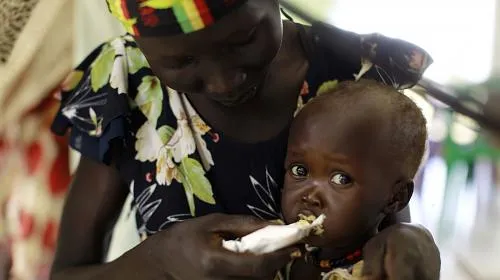After three years of brutal conflict, famine was declared in South Sudan’s Unity State, meaning thousands are dying of starvation. With nearly five million people suffering from extreme hunger, famine is likely to spread to other parts of the country if urgent interventions are not taken.
“The last three years of violence have pushed people over the edge of survival, leaving many families with nothing but leaves and roots to eat,” said Fred McCray, CARE Country Director in South Sudan. “Urgent humanitarian aid is needed to reverse this famine and prevent more people from dying of hunger. But we must be able to safely access those most vulnerable with lifesaving food, so we call on all parties to the conflict to stop targeting civilians and ensure that aid organizations have access to people in need.”
Alarming food crises are sweeping across other parts of the world, with 20 million people at risk of famine in Yemen, Northeast Nigeria, South Sudan and Somalia, according to the UN. All of the food crises in these countries have been exacerbated by war and insecurity.
“Twenty million people at risk of famine, would be like the entire country of Australia facing potential starvation. By the time famine is declared, that means thousands have died and are dying,” said Philippe Guiton, Humanitarian Director at CARE International. “The international community has sat idly by as South Sudan spiraled out of control, and now people, mostly children, are literally dying of hunger. The same fate could spread throughout South Sudan and other at risk countries if urgent aid isn’t provided. We simply cannot allow preventable catastrophic deaths to ensue around the world.”
“Famine/catastrophe” is the worst-case scenario on a five-level scale used in Integrated Phase Classification (IPC) to gauge food security. The scale uses several indicators to declare a famine, including acute malnutrition in more than 30 per cent of children, widespread starvation and destitution are evident and more than two people per 10,000 people are dying each day from hunger. Large-scale displacement of people, civil strife and pandemic illness are also taken into consideration.
Famine was last declared in Somalia in 2011, where 260,000 people died. Nearly half of those deaths occurred before the famine was actually declared. Six years later, severe drought from La Niña and continued insecurity have left Somalia facing famine risks again.
In Yemen, where a civil war has been raging for several years, reports indicate that nine million people are suffering from extreme hunger.
Violent conflict over the last four years in Nigeria and across the Lake Chad Basin has left over 7 million people without proper access to food. According to the Famine Early Warning System, at least 400,000 people in northeast Nigeria could be experiencing famine conditions.
“The common denominator in all these countries that are at risk of famine is conflict. In places like South Sudan, humanitarian aid is what has prevented famine from ravaging the country. The areas that have been declared famine, are areas where aid groups cannot reach people with food supplies due to insecurity from the conflict,” said Guiton.
With limited humanitarian access, as well as, lack of funding, CARE is extremely concerned that conditions will worsen in all of these countries resulting in more unnecessary deaths. CARE calls on all parties to the conflicts to allow unfettered access of humanitarian aid to those in need, and calls on donors to provide the necessary funding needed to save more lives.
CARE works in Yemen, Somalia, South Sudan and countries in the Lake Chad Basin providing food, nutrition and emergency cash assistance.
-END-
Media Contact: Holly Frew hfrew@care.org +1.770.842.6188
About CARE: Founded in 1945, CARE is a leading humanitarian organization fighting global poverty. CARE has more than six decades of experience helping people prepare for disasters, providing lifesaving assistance when a crisis hits, and helping communities recover after the emergency has passed. CARE places special focus on women and children, who are often disproportionately affected by disasters. To learn more, visit www.care.org.

